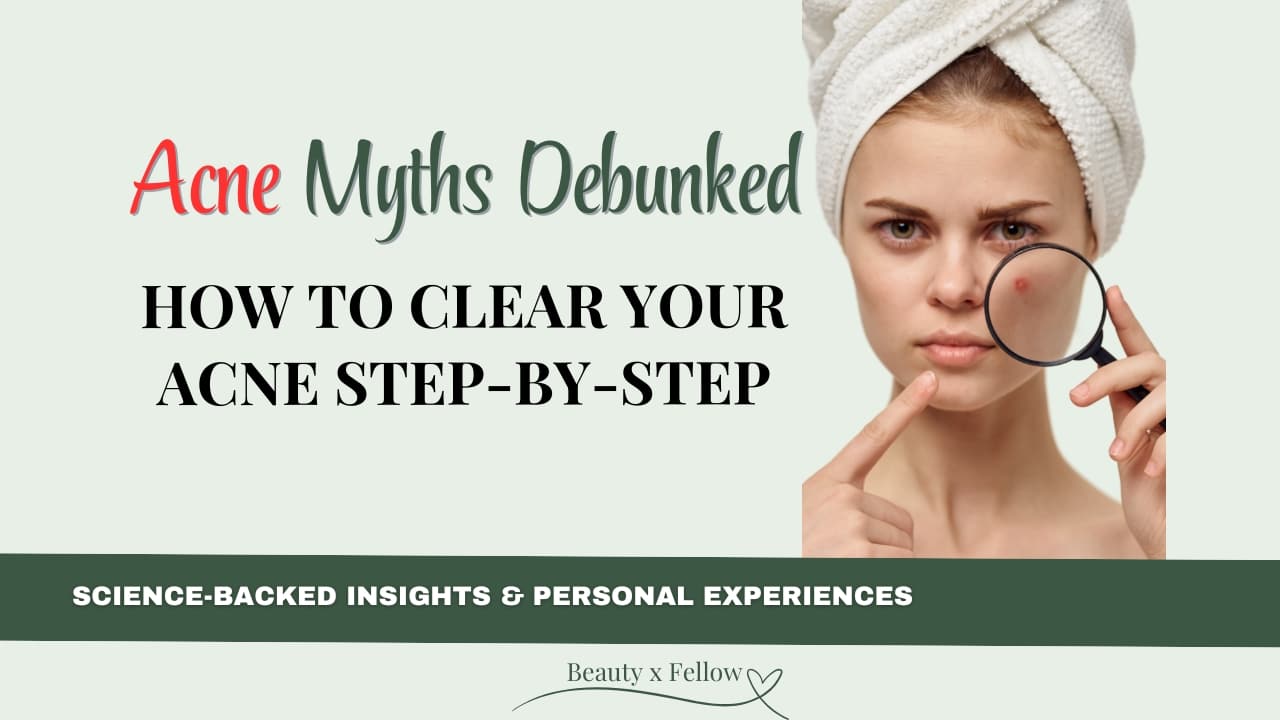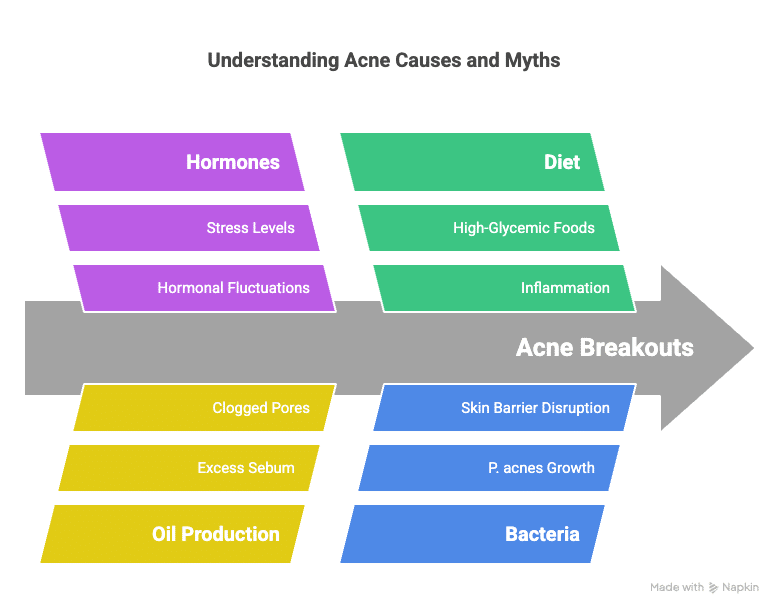
Have you ever been told that eating chocolate will ruin your skin or that scrubbing your face harder will make acne disappear? If so, you’re not alone. When I was a teenager, I believed every piece of advice I heard about acne. I stopped eating my favourite snacks, washed my face three times a day, and even tried toothpaste as a spot treatment (spoiler: it didn’t work). The truth is, acne is one of the most misunderstood skin conditions, and these myths can make it even harder to manage.
In this post, we’ll separate fact from fiction, debunking the most common acne myths with science-backed insights and personal experiences. Whether you’re struggling with breakouts or just want to know the truth, this guide will help you take control of your skin with confidence.
Myth #1: “Chocolate and Greasy Foods Cause Acne”
Let’s start with one of the most popular myths: the idea that eating chocolate or greasy foods like chips causes acne. I remember avoiding chocolate for months because I thought it was the reason for my breakouts. But here’s the truth: there’s no direct scientific evidence linking chocolate or greasy foods to acne.
Acne is primarily caused by factors like hormones, excess oil production, clogged pores, and bacteria—not what you eat. That said, diet can play an indirect role. For example, high-glycaemic foods (like sugary snacks and white bread) can spike your blood sugar, leading to increased inflammation and oil production, which may worsen acne.
Actionable Tip: Instead of cutting out chocolate entirely, focus on a balanced diet rich in fruits, vegetables, and whole grains. These foods can help reduce inflammation and support overall skin health.
Myth #2: “Washing Your Face More Often Prevents Acne”
When I first started dealing with acne, I thought the solution was to wash my face as often as possible. I’d scrub my skin morning, afternoon, and night, hoping it would magically clear up. Unfortunately, this only made things worse.
I understand where this myth comes from. Acne-prone skin often looks oily and greasy, and it’s easy to assume that not cleaning off the excess oil will lead to clogged pores and more breakouts. However, over-washing can strip your skin of its natural oils, causing irritation and prompting your skin to produce even more oil to compensate. This creates a vicious cycle that can lead to more breakouts.
Actionable Tip: Stick to washing your face twice a day—once in the morning and once before bed—with a gentle, non-comedogenic cleanser. Avoid harsh scrubs or soaps that can irritate your skin. If you’ve been sweating (like after a workout), a quick rinse with lukewarm water is enough.
Myth #3: “Acne Only Affects Teenagers”
If you think acne is just a teenage problem, think again. While it’s true that acne is most common during puberty due to hormonal changes, many adults experience it too. According to the NHS UK, “Acne often disappears when a person is in their mid-20s. In some cases, acne can continue into adult life. About 3% of adults have acne over the age of 35.”
Hormonal changes, such as those during a woman’s menstrual cycle, are a common trigger for adult acne. I’ve also seen friends in their 30s and 40s who were shocked to find themselves breaking out again after years of clear skin.
Actionable Tip: If you’re dealing with adult acne, look for products with ingredients like salicylic acid or benzoyl peroxide, which target breakouts without being too harsh. And don’t hesitate to consult a dermatologist—they can help identify the root cause and recommend treatments tailored to your skin.
Myth #4: “Popping Pimples Helps Them Heal Faster”
We’ve all been there: staring at a pimple in the mirror, tempted to pop it. I used to pop pimples as if I were taking revenge on them. It felt satisfying in the moment, but I quickly learned it was doing more harm than good.
Popping pimples incorrectly can push bacteria deeper into the skin, leading to inflammation and delaying the healing process. While a pimple normally takes around 13 days to heal, improper popping can extend this timeline and increase the risk of scarring. That said, it’s okay to pop a pimple if you know it’s ready and you know how to do it correctly. Otherwise, you’re putting your skin at risk for long-term damage.
Actionable Tip: Instead of popping, use a spot treatment with benzoyl peroxide or tea tree oil to reduce inflammation. If you must pop a pimple, make sure it’s a whitehead that’s ready to be extracted, and use clean tools to minimise the risk of infection.
Myth #5: “Sunscreen Makes Acne Worse”
For years, I avoided sunscreen because I thought it would clog my pores and make my acne worse. But skipping sunscreen is a big mistake, especially if you’re using acne treatments that make your skin more sensitive to the sun.
Not only sunscreen but also makeup is often blamed for causing acne. While it’s true that some oil-based makeup products can clog pores if not removed properly, not all cosmetics are bad for acne-prone skin. The key is choosing non-comedogenic products and maintaining a proper skincare routine.
Actionable Tip: Look for a lightweight, oil-free sunscreen labelled “non-comedogenic” or “for acne-prone skin.” Similarly, choose makeup products designed for acne-prone skin and always remove makeup thoroughly before bed.
Myth #6: “Acne Is Caused by Poor Hygiene”
One of the most harmful myths about acne is the idea that it’s caused by being “dirty.” Acne-prone skin often looks oily and greasy, which can lead people to assume it’s a hygiene issue. However, most of the biological reactions that trigger acne occur beneath the skin, not on the surface. This means the cleanliness of your skin has little to no effect on your acne.
Actionable Tip: Be kind to your skin and yourself. Stick to a simple skincare routine with gentle products, and remember that acne is not your fault. If you’re struggling, a dermatologist can help you find effective treatments.

Myth #7: “Acne Will Go Away on Its Own”
This is a belief I’ve heard from older generations: “It’s normal to have acne as a teenager; you’ll grow out of it.” While it’s true that acne is one of the most common skin issues—affecting nearly everyone at some point—this doesn’t mean it will always go away on its own.
Some people are lucky and only experience mild acne that clears up quickly. But for others, like me, acne can persist for years or even decades. Without proper treatment, it often worsens, leading to scarring and emotional distress.
Actionable Tip: Don’t wait for acne to “grow out.” Seek targeted treatments, whether over-the-counter products or prescription medications, to manage and clear your skin effectively.
you will achieve clear skin
Acne myths can be frustrating and misleading, but understanding the facts is the first step toward clearer skin. From debunking the idea that chocolate causes acne to learning why over-washing your face isn’t the answer, this guide has hopefully cleared up some common misconceptions.
Remember, acne is a complex condition that often requires a combination of lifestyle changes, skincare, and professional advice. If you’re feeling overwhelmed, don’t hesitate to reach out to skin experts—they’re there to help and you will achieve clear skin by staying consistent with your treatment plan!
What are the most common acne myths?
Some common acne myths include the belief that chocolate and greasy foods cause acne, over-washing your face prevents breakouts, and acne only affects teenagers. These misconceptions can lead to ineffective treatments and frustration.
Does eating chocolate really cause acne?
No, there is no direct scientific evidence linking chocolate to acne. However, high-glycaemic foods, which can include sugary snacks, may indirectly worsen acne by increasing inflammation and oil production.
Is it okay to pop pimples?
Popping pimples is not recommended as it can lead to scarring, inflammation, and delayed healing. If you must pop a pimple, ensure it’s ready (a whitehead) and use clean tools to minimise damage.
Can sunscreen or makeup cause acne?
Not all sunscreens or makeup cause acne. Look for non-comedogenic, oil-free products designed for acne-prone skin, and always remove makeup thoroughly before bed to prevent clogged pores.
Does acne go away on its own?
While mild acne may clear up naturally, many cases require proper treatment to prevent it from worsening. Without intervention, acne can persist for years and lead to scarring.
Why do adults get acne?
Adult acne can be caused by hormonal changes, stress, or certain skincare products. According to the NHS, about 3% of adults over 35 still experience acne.
Is acne caused by poor hygiene?
No, acne is not caused by poor hygiene. Most acne-related reactions occur beneath the skin due to hormones, genetics, and bacteria, not surface cleanliness.






